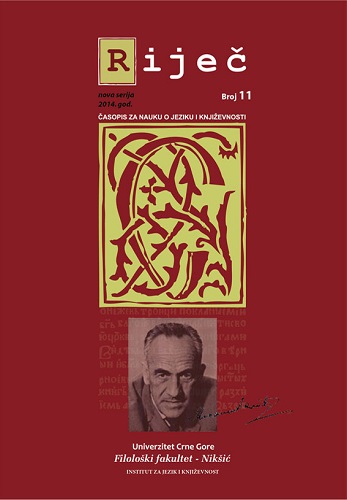U znaku vjere u riječ: estetičke strategije Vladimira Nabokova u romanu U znaku nezakonito rođenih
Bent by the Faith in Word: Aesthetic Strategies in Vladimir Nabokov's Novel "Bend Sinister" Summary
Author(s): Vanja D. Vukićević GarićSubject(s): Other Language Literature, Theory of Literature
Published by: Filološki fakultet, Nikšić
Keywords: Aestheticization; fictionalisation; ontological levels; authornarrator; protagonist-narrator; doubling; the art of words
Summary/Abstract: This paper examines some of the fundamental assumptions of Vladimir Nabokov‘s poetics and aesthetics as articulated through his novel Bend Sinister, analysing particular narrative procedures that point towards his understanding of ontological relation between text and reality, as well as between the author, the narrator and the protagonist. Even though it can be recognised as a typical postmodernist work in many aspects, this novel also expresses a specific (anti)political statement of protest against all repressive systems which confine individual and creative freedom. Structured as the system ―Chinese boxes―, containing multiple narrative doublings and the recognisably Nabokovian game of mirrors, Bend Sinister foregrounds the question of authenticity of empirical reality, especially when that reality is historically absurd and psychologically brutal, interrogating it against the power of art to transform it and, by means of particular verbal devices, to surpass it. Comprising plenty of autobiographical material on the one hand, and a certain ―novel within the novel― on the other, Bend Sinister focuses on the complex relationship between the hero, Adam Krug, and his creator, underlining their similarity in understanding the art of literature. As this paper indicates, both of them experience writing as an existential activity necessary for survival and text as an ontologically powerful and recuperating form of reality. Aestheticization of empirical experience, which is the basis of Nabokov‘s as well as Krug‘s literary activity, has been explained in this work through doubling of the narrating instances, which occurs at many levels and on both sides of textual borders.
Journal: Riječ
- Issue Year: 2014
- Issue No: 11
- Page Range: 253-270
- Page Count: 18
- Language: Serbian

